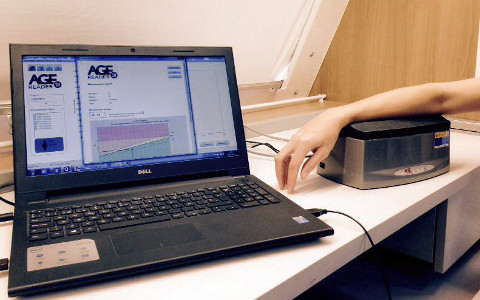Predicting cardiovascular risk in the early stages of kidney disease
Researchers at the University of Lleida, IRB and Arnau PGA validated as a marker
Download PdfResearchers at the University of Lleida (UDL), the Department of Endocrinology, University Hospital Arnau de Vilanova and the Institute of Biomedical Research Foundation Dr. Lleida Pifarré (IRBLleida) have shown a direct relationship between glucose-modified proteins called advanced glycation end products (PGA) and atherosclerotic disease hidden. This allows real predict cardiovascular risk in the early stages of chronic kidney disease, according to recently published in the prestigious international scientific journal Plos One.
The PGA - English AGE (Advanced Glycation End Products) - are proteins that emit fluorescence that can be detected through the skin using a device non-invasively and quickly, in just 12 seconds. These substances contribute to the formation of plaques of fat (atheroma) in the arteries. Previous research had found that the PGA are increased in patients with chronic kidney disease who undergo hemodialysis, but there was little information about how it affects the initial stages.
Researchers Group Basic and Clinical Immunology and Endocrinology and the UDL IRBLleida have conducted a case control comparison that includes 87 patients with CKD stages variables (mild to moderate) and 87 healthy subjects matched for age, sex and body mass index. The results show that the fluorescence of the skin is higher in patients with chronic kidney disease.
The research group also performs non-invasive test that is currently under the project 'Bus Health', promoted by the Province of Lleida. With the results of the participant population, the researchers can determine the importance of these proteins in the formation of atherosclerotic plaques.
Text: IRBLleida Communication / Press Office UDL
